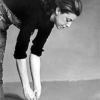Helen Frankenthaler

Helen Frankenthaler
Helen Frankenthalerwas an American abstract expressionist painter. She was a major contributor to the history of postwar American painting. Having exhibited her work for over six decades, she spanned several generations of abstract painters while continuing to produce vital and ever-changing new work. Frankenthaler began exhibiting her large-scale abstract expressionist paintings in contemporary museums and galleries in the early 1950s. She was included in the 1964 Post-Painterly Abstraction exhibition curated by Clement Greenberg that introduced a newer generation of abstract...
NationalityAmerican
ProfessionPainter
Date of Birth12 December 1928
CityNew York City, NY
CountryUnited States of America
I've explored a variety of directions and themes over the years. But I think in my painting you can see the signature of one artist, the work of one wrist.
What has made it work, or what makes certain paintings successful or not, has to do with my being a painter and a thinking, feeling person, more than my sex, color, height, origin.
The price for living the life I have -- for any serious, devoted person, is that at times one must live alone, or feel alone. I think loneliness is associated in many people's minds when they think about success.
A really good picture looks as if it's happened at once. It's an immediate image. For my own work, when a picture looks labored and overworked, and you can read in it—well, she did this and then she did that, and then she did that—there is something in it that has not got to do with beautiful art to me. And I usually throw these out, though I think very often it takes ten of those over-labored efforts to produce one really beautiful wrist motion that is synchronized with your head and heart, and you have it, and therefore it looks as if it were born in a minute.
The landscapes were in my arms as I did it.
One really beautiful wrist motion, that is synchronised with your head and heart, and you have it. It looks as if it were born in a minute.
We would sift through every inch of what it was that worked, or if it didn't, and wonder what was effective in it, in terms of paint, the subject matter, the size, the drawing.
The question of sex will take care of itself.
I follow the rules until I go against them all.
I have always been concerned with painting that simultaneously insists on a flat surface and then denies it.
What concerns me when I work, is not whether the picture is a landscape, or whether it's pastoral, or whether somebody will see a sunset in it. What concerns me is - did I make a beautiful picture?
In relations with people, as in art, if you always stick to style, manners, and what will work, and you're never caught off guard, then some beautiful experiences never happen.
I don't start with a color order, but find the colors as I go.
Whatever the medium, there is the difficulty, challenge, fascination and often productive clumsiness of learning a new method: the wonderful puzzles and problems of translating with new materials.